 Petzlover
Petzlover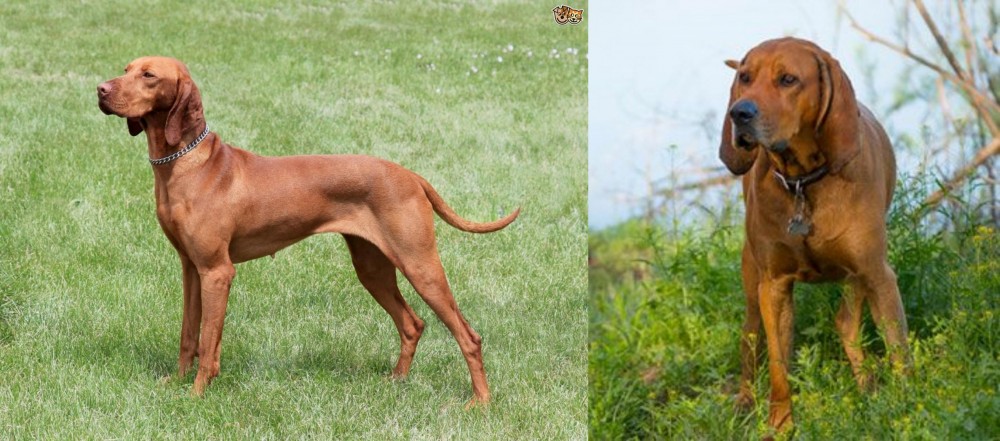 Hungarian Vizsla is originated from Hungary but Redbone Coonhound is originated from United States. Hungarian Vizsla may grow 6 cm / 2 inches shorter than Redbone Coonhound. Both Hungarian Vizsla and Redbone Coonhound are having almost same weight. Hungarian Vizsla may live 4 years less than Redbone Coonhound. Both Hungarian Vizsla and Redbone Coonhound has almost same litter size. Both Hungarian Vizsla and Redbone Coonhound requires Low Maintenance.
Hungarian Vizsla is originated from Hungary but Redbone Coonhound is originated from United States. Hungarian Vizsla may grow 6 cm / 2 inches shorter than Redbone Coonhound. Both Hungarian Vizsla and Redbone Coonhound are having almost same weight. Hungarian Vizsla may live 4 years less than Redbone Coonhound. Both Hungarian Vizsla and Redbone Coonhound has almost same litter size. Both Hungarian Vizsla and Redbone Coonhound requires Low Maintenance.
 The Hungarian Vizslas existed in the land that is now Hungary, the Pannonian Basin, at least since the 10th century when they were shown on etchings. It is thought that their descendants were various pointers, the extinct Turkish Yellow Dog and the Transylvanian Hound. The Vizsla is a hunting dog with the word being Hungarian for pointer. In 1937 the Carmelite Friars under orders from King Louis I of Hungry. The breed was isolated for centuries in the Basin by the aristocracy and land owners.
The Hungarian Vizslas existed in the land that is now Hungary, the Pannonian Basin, at least since the 10th century when they were shown on etchings. It is thought that their descendants were various pointers, the extinct Turkish Yellow Dog and the Transylvanian Hound. The Vizsla is a hunting dog with the word being Hungarian for pointer. In 1937 the Carmelite Friars under orders from King Louis I of Hungry. The breed was isolated for centuries in the Basin by the aristocracy and land owners.
The Magyar people of the area developed the breed for hunting as both pointers and retrievers. They were excellent at hunting rabbits and water fowl. With a terrific sense of smell and boundless stamina and energy, the were prized as family and companion dogs as well. This was unusual for a hunting or working dog. Their size made them appealing as well. They were small by comparison to other hunting dogs both pointers and retrievers.
Easy to train, the Hungarian Vizsla works in water, forests and fields. They are able to retrieve in the water as well as on the land. Throughout their history, the breed outlasted the Turkish Revolution, the Hungarian Revolution World War 1 and World War 2, as well as the Hungarian People’s Republic Communist State. Things were a little dicey for the Vizlas several times beginning in the 1800’s when German Shorthaired Pointers and English Pointers were introduced into the area. The next time was after World War II. Fearful of what this Communist state would mean for the breed, some were smuggled into the United States and Austria.
At that time there were only a dozen or so Vizslas in all of Hungary. Their numbers were brought back from that small breeding stock. This history did result in several different strains grew into their own breeding stock. There are Vizslas in Czechoslovakia, Romania, Serbia and Austria. There developed separate lines that became separate breeds in the Wirehaired Vizsla and the longhaired Vizsla which is very rare.
After World War II, the Hungarian Vizsla came to the United States and the Vizsla Club of American was established as a first step toward AKC (American Kennel Club) recognition. This was attained in 1960. Rex del Geisimino came to the U.S. in 1951 and he was able to respond to commands in both German and Hungarian. Vizslas also came to the United Kingdom in this time frame. There are now about 4500 registered with the KC (Kennel Club of Great Britain). A Vizsla won the distinctive Crufts Dog Show in Great Britain, as Best in Show.
It is believed that this gentle, sensitive and affectionate hunter was part of the original breeding stock or the Wirehaired Vizsla, the Weimaraner and the German Shorthaired Pointers. The Hungarian Vizsla is intelligent and social. The need your attention as well as a lot of exercise to avoid destructive behavior born of boredom. They want to be with you and they can be very protective of you.
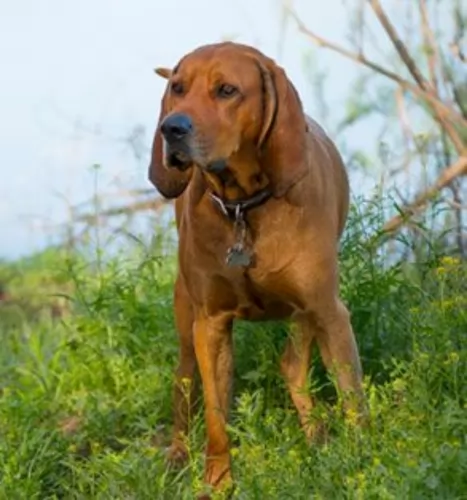 The Redbone Coonhound has always had a busy life hunting bear, deer and cougar. It is thought that this dog descends from from Bloodhounds, Foxhounds and Irish Hounds.
The Redbone Coonhound has always had a busy life hunting bear, deer and cougar. It is thought that this dog descends from from Bloodhounds, Foxhounds and Irish Hounds.
Hailing from America, this dog has been registered with the American Kennel Club since 2009.
It was during the 18th century that many European-type hunting dogs were imported to America. Over time, Southern hunters bred with stamina and this ultimately lead to the emergence of coonhounds.
 The Hungarian Vizsla has a light build, a short coat, and a distinctive bearing. They are medium in size and muscular, lean dogs looking a lot like the Weimaraner. They are also close in appearance to the Rhodesian Ridgeback and the Redbone Coonhounds. They are more muscular and leaner than the Rhodesian Ridgeback and Weimaraner.
The Hungarian Vizsla has a light build, a short coat, and a distinctive bearing. They are medium in size and muscular, lean dogs looking a lot like the Weimaraner. They are also close in appearance to the Rhodesian Ridgeback and the Redbone Coonhounds. They are more muscular and leaner than the Rhodesian Ridgeback and Weimaraner.
The Vizsla has a reddish nose and their nails and eyes should also be reddish or blending with the color of their coat. They have docked tails in the American standard but not in the United Kingdom, as docking is banned there. If he has a tail, you can see it flying through the air as he runs through the rough land to retrieve fowl.
They have a domed skull with a tapered muzzle that is shorter or equal to the skull. They have eyes that are contrasted with the coat and of medium size. The ears of silky, hang close to the face and the tips are rounded. The coat is rust in color with many shades. He also has a deep chest and hound like face.
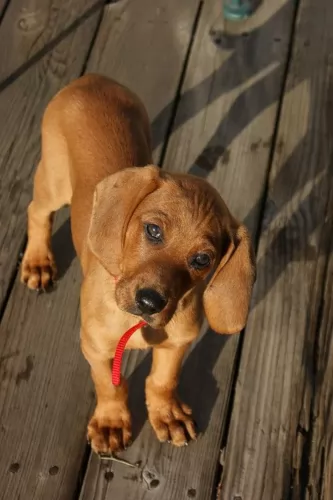 This beautiful, shiny red dog is medium-sized and stands at between 53 and 70cm at the shoulders and weighs between 20 and 32kg.
This beautiful, shiny red dog is medium-sized and stands at between 53 and 70cm at the shoulders and weighs between 20 and 32kg.
The dog’s coat is short and smooth with maybe just a tiny bit of white found around the feet and chest area. He is lean and muscular with strong, straight legs and a deep chest. The ears are floppy and the tail, traditionally docked, is often left long these days.
The paws are large and webbed and when the dog is excited, the tail is held high
The Redbone Coonhound is an affectionate dog who wants to please his owners. He just loves his human family and would be beside himself if he were locked outside day after day.
He is a social dog who should be allowed time indoors and out. They make splendid playmates for children too, and get along well with other animals in the house.
Because they’re independent and strong willed, he will need to be trained and socialized to ensure he is well mannered and obedient.
He is an active dog and will require a good bout of exercise. He is vocal, known for his baying type of bark, and training will keep this kind of baying under control. Training is also necessary as this dog is stubborn. He is intelligent enough to learn, and once trained, is gentle and calm.
 Children friendliness - The Vizsla is very good with children.
Children friendliness - The Vizsla is very good with children.
Special talents - They are both excellent pointers and retrievers.
Adaptability - They are not very adaptable in living arrangements as they are much more suited for the country than the city.
Learning ability – The Vizsla is a very intelligent breed and easy to train. His learning ability is very high.
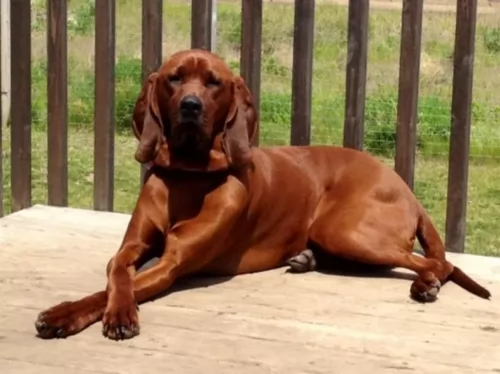 The Redbone loves the company of his human family. He is such a friendly dog,getting on well with everyone in the family, including the children and other pets.
The Redbone loves the company of his human family. He is such a friendly dog,getting on well with everyone in the family, including the children and other pets.
He is a hunting dog and always ready to be part of any activities his human family is involved in. He is gentle and easy going, and and having him in your life is guaranteed to bring in a lot of joy and sunshine.
 The Hungarian Vizsla has a series of health issues that include:
The Hungarian Vizsla has a series of health issues that include:
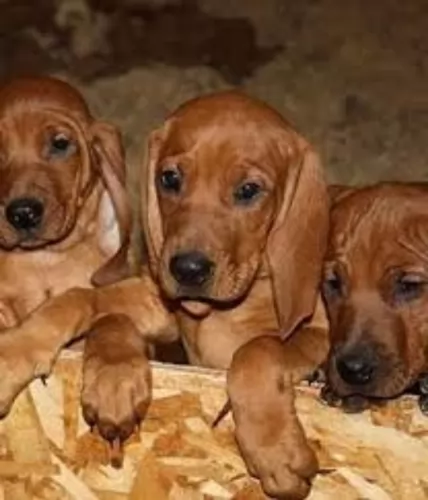 The Redbone Coonhound is generally a healthy breed that can reach 12, 13, 14 years of age if well cared for.
The Redbone Coonhound is generally a healthy breed that can reach 12, 13, 14 years of age if well cared for.
There are some common dog illnesses that this do can succumb to and which are worth knowing about as they affect so many dogs. These are cancer, bloat, skin allergies, ear infections and hip dysplasia.
If you notice that your active dog is subdued and lethargic, it is your responsibility to get your 4-legged child to the vet to be looked over.
 Feed two to four cups per day of a high quality dry dog food. Break this up into three or four meals. Don’t free feed your puppy.
Feed two to four cups per day of a high quality dry dog food. Break this up into three or four meals. Don’t free feed your puppy.
Feed two to three cups per day of high quality dry dog food. Feed in two servings.
The Vizsla is an athlete with high energy.
The Hungarian Vizsla needs at least 30 minutes of exercise every day and maybe more. He needs a large yard or open field, but daily brisk walks will do if that is all that is possible. He needs to be stimulated intellectually as well and enjoys fetch, jogging with you, lure coursing, field trials, tracking and scent work, confirmation, agility, barn hunt, dock diving, rally, and obedience.
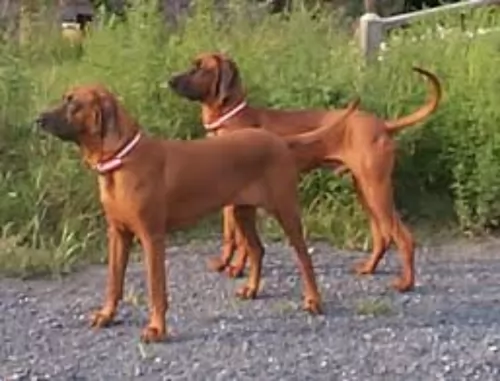 Hunting dogs such as the Redbone Coonhound will need a good deal of exercise to stay happy and healthy. The breed is best suited to the countryside or suburbs as opposed to city dwelling.
Hunting dogs such as the Redbone Coonhound will need a good deal of exercise to stay happy and healthy. The breed is best suited to the countryside or suburbs as opposed to city dwelling.
He won’t be content with just a walk every day but is the kind of dog that will want to be free from a leash and be running far and wide. When at home, involve him in some rope- and ball games.
The Redbone Coonhound isn’t going to be a dog that you have to fuss over. His short coat can be brushed twice a week to keep him looking beautifully shiny. When you brush him, make sure you check for any unusual lumps.
He has floppy ears, so look inside his ears for signs of redness and discharge. This could be an indication of an ear infection. Also check inside his mouth as he could have a rotting tooth which could be causing him a lot of pain and also be poisoning his body.
You want to ensure your beautiful Redbone Coonhound stands every chance to enjoy good health. Every dog owner should try to feed their dog the best food there is.
There are some good commercially manufactured foods on the market and these are wonderfully convenient to use for your dog. However, you want to provide him with some good homemade food too.
Dogs thrive on simplicity and consistency with their diets because then it prevents upset stomachs. Some home-cooked food such as boiled chicken, sweet potatoes, brown rice or pasta, carrots and spinach will be perfect for him.
Chop the food up finely and add it into the dry kibble once or twice a week. Raw meat can also be added in occasionally to promote good skin health. Make sure your pet is never without a constant supply of fresh, cool water.